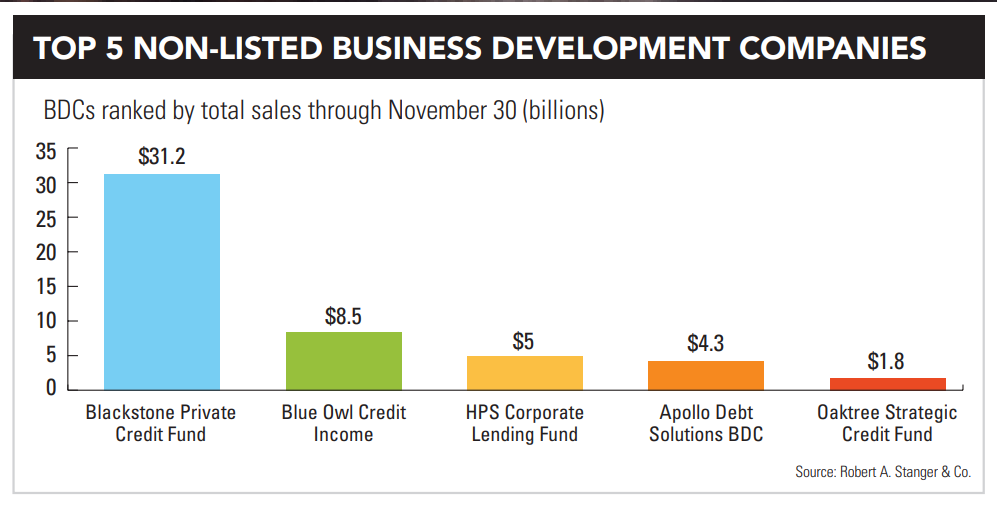

Large institutional asset managers are pursuing retail financial advisors to make the sale of alternative investments more mainstream.
But alternative investments make some financial advisors and their clients nervous. Typically more expensive than plain vanilla stock and bond mutual funds and exchange-traded funds, they are at times volatile, potentially sensitive to swings in interest rates and sharp movements in the stock and bond markets.
Case in point: for more than a year, investors have been pulling their money from non-traded real estate investment trusts and, most notably, from the industry’s biggest player, the $61 billion Blackstone Real Estate Income Trust.
Blackstone and other large money managers spent decades ignoring independent brokers and registered investment advisors, who typically work with less wealthy clients than wirehouses, private banks, and family offices.
Blackstone launched its non-traded REIT in 2016, a time when some large public pension funds were shunning alternative investments because of the high expenses and a steady number of financial advisors were leaving the wirehouses to work as independent advisors, a situation in which advisors can earn a bigger piece of the revenue they create than at the wirehouse.
But independent broker-dealers may not be embracing the alternative asset managers as fully as some had hoped. Sales of non-traded REITs slowed precipitously last year in the wake of investors pulling money from the Blackstone REIT. And some broker-dealers executives, burned in the past by volatile alternative investments, are eyeing the asset class as a whole with caution.
At an industry meeting last month, three senior executives at large independent broker-dealers, including giants Osaic. and Cambridge Investment Research, expressed concerns about financial advisors selling alternative investments.
Executives said their firms had pulled back from selling such products.
“We stopped selling alts in 2019 and have not had any litigations since,” said a senior executive at a large firm who spoke privately to InvestmentNews about the matter at the Financial Service Institute’s annual meeting, OneVoice, in Orlando, Florida.
At Osaic, formerly Advisor Group, sales of alternative investments peaked close to a decade ago, when they made up close to 10 percent of the firm’s revenue, Osaic CEO Jamie Price said in an interview on the sidelines at OneVoice. Now the portion of revenue from alts is close to 2.5 percent, Price said, “and it’s better alternative managers.”
“We probably have pulled back a little bit” from alternative investments, Seth Miller, general counsel, Cambridge Investment Research, said on a panel about alternative investments. “I think we used to be a little more aggressive than we are today. We’re still not where the regulators want us to be, which is, don’t sell [alternative investments] at all.”
The product sponsors and asset managers aren’t about to slow their efforts to market more product to broker-dealers, which provide a gateway to tens of thousands of financial advisors. And some big firms, including Blackstone, are adding new alternative investment products to their quiver.
In January, Blackstone said a new fund for wealthy clients that focuses on private equity, Blackstone Private Equity Strategies Fund, had raised $1.3 billion, a staggering amount for a new fund.
Osaic’s Price is a wirehouse veteran, having worked in various roles at UBS between 2002 and 2010, including a stint as head of wealth management for its Advisor Group Americas. In 2016, he took over as CEO of Advisor Group, which rebranded as Osaic last year.
In his experience, the alternative investment managers selling their products through independent broker-dealers have improved and become more sophisticated over the past eight years.
“When I got here in 2016, I had no idea who the alternative investment sponsors were,” Price said. “I didn’t know any of their names. At UBS, we did alts, but we did them with KKR and Blackstone. I think there was a whole [alternative investment] industry preying on the independent [broker-dealer] industry.
“We never would have put some of those companies on our platform at UBS,” he said. “They would never have made it through.
“And so [Advisor Group] took the alts shelf way down, and now we’ve built it back up using platforms like CAIS,” Price added. “Or take, for example, Blackstone, which is one of our largest alts platforms. We’re not working with no-name sponsors.”
At Cambridge Investment Research, Miller said that the firm’s staff and attorneys are still working in the shadow of a small alternatives fund, the LJM Preservation and Growth Fund, that blew up in 2018. The firm eventually settled with the Financial Industry Regulatory Authority and paid fines and restitution to clients of $3.5 million, according to its BrokerCheck report.
“This brought to the forefront how many financial professionals were using these products and didn’t really know that much about them,” Miller said, noting that Cambridge put certain education requirements in place and also changed how it monitored sales.
Financial advisors didn’t like that, he said.
“Talk about people screaming and yelling,” Miller said, adding that advisors at Cambridge complained that the changes weren’t fair.
“We got a better understanding of how they were using these products, and I think they became a lot more educated on how complex they really were,” he added.


While industry statistics pointing to a succession crisis can cause alarm, advisor-owners should be free to consider a middle path between staying solo and catching the surging wave of M&A.

New joint research by T. Rowe Price, MIT, and Stanford University finds more diverse asset allocations among older participants.

With its asset pipeline bursting past $13 billion, Farther is looking to build more momentum with three new managing directors.

A Department of Labor proposal to scrap a regulatory provision under ERISA could create uncertainty for fiduciaries, the trade association argues.

"We continue to feel confident about our ability to capture 90%," LPL CEO Rich Steinmeier told analysts during the firm's 2nd quarter earnings call.
Orion's Tom Wilson on delivering coordinated, high-touch service in a world where returns alone no longer set you apart.
Barely a decade old, registered index-linked annuities have quickly surged in popularity, thanks to their unique blend of protection and growth potential—an appealing option for investors looking to chart a steadier course through today's choppy market waters, says Myles Lambert, Brighthouse Financial.
